All’s Well That Ends Well
Act Four
By Dennis Abrams
———————————————–
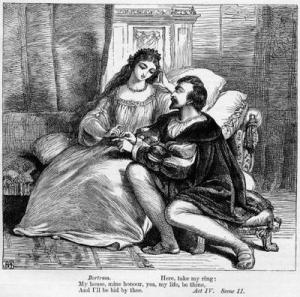 Act Four: The two plots move forward. Disguised as enemy soldiers, the Dumaine brothers ambush Parolles and interrogate him. When he nonchalantly slanders his comrades, they remove his blindfold and unmask themselves. In the meantime, Diana has persuades Bertram to swap his ring for one of her own (which is, in fact, actually Helena’s), to seal the agreement that he will visit her chamber at midnight. All goes according to plan, and Helena – who by now has spread rumors of her own death – leaves for France in the company of the Widow Capulet and Diana, intending to tell the King everything. However, believing Helena to be dead, Lafew has begun negotiating with the Countess to marry his daughter off to the now “widowed” Bertram.
Act Four: The two plots move forward. Disguised as enemy soldiers, the Dumaine brothers ambush Parolles and interrogate him. When he nonchalantly slanders his comrades, they remove his blindfold and unmask themselves. In the meantime, Diana has persuades Bertram to swap his ring for one of her own (which is, in fact, actually Helena’s), to seal the agreement that he will visit her chamber at midnight. All goes according to plan, and Helena – who by now has spread rumors of her own death – leaves for France in the company of the Widow Capulet and Diana, intending to tell the King everything. However, believing Helena to be dead, Lafew has begun negotiating with the Countess to marry his daughter off to the now “widowed” Bertram.
Before the questions about Helena and Bertram can be answered (if they ever are), All’s Well moves away from its main subject to its minor (but still important) subplot, invented by Shakespeare, in which Parolles is shown to be as untrustworthy towards his apparent friends as we, the audience, have realized he is toward everyone else. His fellow soldiers conceive a ruse that, disguised as Russian troops, they will capture Parolles, blindfold him, threaten him with execution, and by doing so expose him as a lying coward. All goes according to plan (as does Helena’s): Parolles gives up all the military secrets he had sworn to keep without so much as pausing for breath, and is equally open with his opinions regarding his fellow soldiers – much to their private displeasure. They then discover that he is carrying a letter addressed to Diana, warning her of Bertram’s intentions. Still fooled, Parolles freely explains it all:
My meaning in’t, I protest, was very honest in the behalf of the maid, for I knew the young Count to be a dangerous and lascivious boy, who is a whale to virginity, and devours up all the fry it finds.
The irony is, naturally, that the inveterate liar Parolles is nothing other than “honest” here, as Bertram well – and furiously knows. And though at first sight this scene seems to sit outside the main curve of the play, as the action develops it becomes evident how closely it informs and reflects on the central plot: in this topsy-turvy world a professional con-artist can as easily tell the truth as a woman can guarantee her husband’s virtue by arranging him an affair.
————————————
From Bloom:
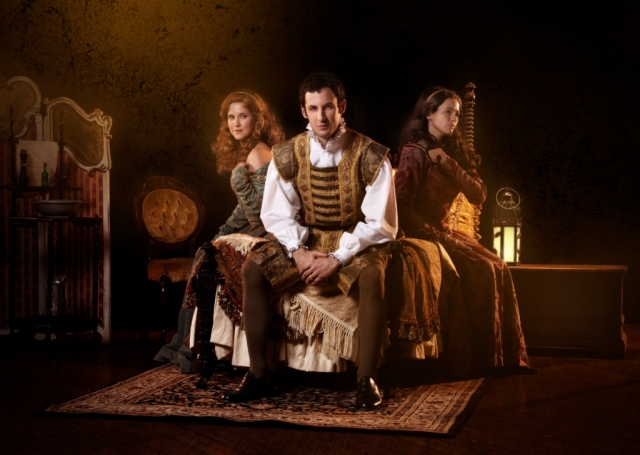 “Our uneasiness [with Helena and the bed trick] out to augment when we ponder Helena’s language as she anticipates her impending union with the gulled Bertram:
“Our uneasiness [with Helena and the bed trick] out to augment when we ponder Helena’s language as she anticipates her impending union with the gulled Bertram:
But, O strange men!
That can such sweet use make of what they hate,
When saucy trusting of the cozen’d thoughts
Defiles the pitchy night; so lust doth play
With what it loathes for that which is away.
But more of this hereafter.
The superb rancidity of this resides in its pragmatism; does literature afford a cooler, more dispassionate female view of male lust? Helena’s pungent phrase, ‘saucy trusting,’ will reverberate in Measure for Measure [My Note: Of “from” depending on how you date the plays] when the hypocrite Angelo equates murder with illicit procreation: ‘Their saucy sweetness that do coin heaven’s image/In stamps that are forbid.’ ‘Saucy’ in each case means both ‘insolent’ and ‘lascivious,’ and the strength of Helena’s insight turns, in part, upon her mingled sense that male lust is at once pungent, undifferentiated, and misogynistic. Though Helena promises us ‘more of this hereafter,’ we will not (alas) listen to her again upon this matter. As she tells us instead, the entire play must inform us, even as she cites its title:
Yet, I pray you;
But with the word: ‘the time will bring on summer’ –
When briars shall have leaves as well as thorns
And be as sweet as sharp. We must away;
Our wagon is prepar’d; and time revives us.
All’s well that ends well; still the fine’s the crown.
Whate’er the course, the end is the renown.
This deliberate mishmash of proverbs is properly bittersweet, and is intended to justify Helena’s audacity, itself a sauciness we need not underestimate. The bed trick is one thing, and fair game if you want to play it, but is it not a very different matter to pretend death, so as to grieve the foster mother Countess, the King, and LaFew? Helena’s tactics here prelude those of the more-than-dubious Duke in Measure for Measure, when he cruelly deceives Isabella and everyone else as to Claudio’s death. Not that Helena, like the Duke, is a sadist, but rather that she is relentless in her drive to make all’s well for herself by ensnaring the inedible Bertram. This quest must strike the audience as singularly unwholesome, and Shakespeare gives every sign that he is well aware of our ambivalence, not toward Helena but toward her unrepentant mission.”
From Garber:
“In the Countess’s household there is a clown, Lavatch, whose jests and requests early on anticipate some of the play’s darker themes. In a part written for Robert Armin, who played the more complex fools of Shakespeare’s middle years (replacing the more broadly comic Will Kemp), Lavatch sings a song about Helen of Troy and recites another snatch of verse about marriage and cuckoldry, and thus encapsulates both Bertram’s story and Parolles.’ Lavatch’s desire to marry “Isbel the woman’ because he is ‘driven on by the flesh’ may remind audiences of the similarly cheerful and carnal fool Touchstone in As You Like It. (‘Isbel’ is a nicely down-market version of the far more formal, and far more virginal Isabella, immortalized in Shakespeare’s Measure for Measure.)
How does the riddling love plot cohere with the much broader comedy of Lavatch and the downfall of the ‘jackanapes/With scarfs,’ the posturing Paroles? In a general sense Bertram’s adventures and Parolles’ are both concerned with honor and dishonor, and with the loss of the material embodiments of honor: a woman’s virginity (in the love plot) and the regimental drum (in the comic plot of Paroles and the soldiers). Whether or not the morphological analogy between drum and hymen (both are membranes stretched across cylindrical openings) would have been noted by an early modern audience, the symbolic role of each is fairly clear, and is emphasized by their juxtaposition in All’s Well. Both become issues in act 3, where we learn from the Widow that Bertram seeks to ‘[c]orrupt the tender honour of a maid,’ her daughter Diana, and only a few lines later that Parolles, returning from battle is melancholy and ‘shrewedly vexed’ because he has lost ‘our drum.’ Is the theft of virginity like the theft of a drum?
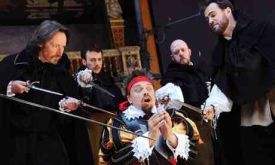 The plot against Paroles, hatched by two French lords to prove to Bertram that Paroles is, as one of them puts it, ‘a most notable coward, an infinite and endless liar, an hourly promise0maker, the owner of no one good quality worthy of your lordship’s entertainment’ is to ‘let him fetch off his drum, which you hear him so confidently undertake to do.’ They will pretend to be enemies, ‘bind and hoodwink’ him, and see whether they can persuade him to betray Bertram and ‘deliver all the intelligence in his power against you.’ The lords regard this as a joke: ‘O for the love of laughter hinder not the honour of his design; let him fetch off his drum.’ But the resonant word ‘honour’ attaches repeatedly to both the exploit and the drum itself, described by Bertram to Paroles, in deliberately inflated terms, as ‘this instrument of honour.’ Both before and after the drum scene the word ‘honour’ is used to describe Diana’s virginity, for which she will likewise hoodwink Bertram into bargaining in the episode of the ring trick and the bed trick:
The plot against Paroles, hatched by two French lords to prove to Bertram that Paroles is, as one of them puts it, ‘a most notable coward, an infinite and endless liar, an hourly promise0maker, the owner of no one good quality worthy of your lordship’s entertainment’ is to ‘let him fetch off his drum, which you hear him so confidently undertake to do.’ They will pretend to be enemies, ‘bind and hoodwink’ him, and see whether they can persuade him to betray Bertram and ‘deliver all the intelligence in his power against you.’ The lords regard this as a joke: ‘O for the love of laughter hinder not the honour of his design; let him fetch off his drum.’ But the resonant word ‘honour’ attaches repeatedly to both the exploit and the drum itself, described by Bertram to Paroles, in deliberately inflated terms, as ‘this instrument of honour.’ Both before and after the drum scene the word ‘honour’ is used to describe Diana’s virginity, for which she will likewise hoodwink Bertram into bargaining in the episode of the ring trick and the bed trick:
Diana:
Give me that ring.
Bertram:
I’ll lend it thee, my dear, but have no power
To give it from me.
Diana:
Will you not, my lord?
Bertram:
It is an honour ‘long to our house,
Bequeathed down from many ancestors,
Which were the greatest obloquy I’ th’ world
In me to lose.
Diana:
My honour’s such a ring.
My chastity’s the jewel of our house,
Bequeathed down from many ancestors,
Which were the greatest obloquy i’ th’ world
In me to lose…
…………..
Bertram:
Here, take my ring.
My house, mine honour, yea my life be thine,
And I’ll be bid by thee.
Her detailed instructions to him – he is to remain with her only an hour in bed and not speak to her; she will put another ring on his finger and thus perform a ceremony of betrothal – are described by Bertram as promising ‘a heaven on earth, ‘but when she is left alone on the stage she makes clear her intentions to ‘cozen him that would unjustly win.’
In a conversation between the two French lords, the onstage audience, the planned seduction is again juxtaposed to the trick to be played upon Paroles, whom Bertram now describes as ‘a counterfeit model’ who ‘deceived me like a double-meaning prophesier.’ Bertram seems completely oblivious of the fact that words like ‘counterfeit,’ ‘deceived,’ and, indeed, ‘double-meaning prophesier’ might be applicable to himself in his dealings with Diana. But as we have noted, Diana is herself adept at double meanings, and her riddling language, which is to culminate in the final revelations scene, begins as soon as she has struck her bargain: ‘He had sworn to marry me/When his wife’s dead; therefore I’ll lie with him/When I am buried.’ Although these lines represent an early modern commonplace, they are uncannily reminiscent of that other young ‘Capulet’ woman, Juliet (‘If he be married/My grave is like to be my wedding bed.’)
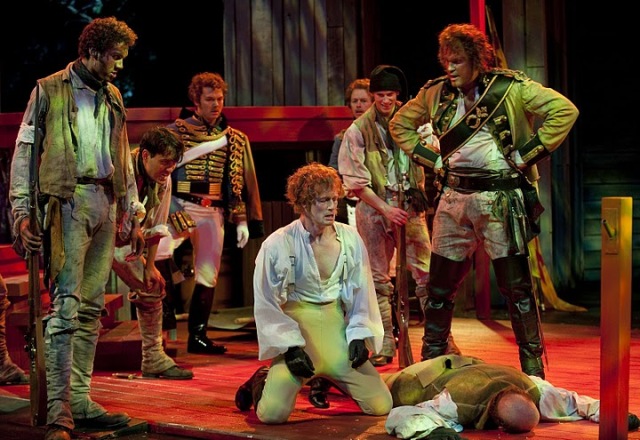 The two hoodwinking scenes (Bertram in the dark with a woman he thinks is Diana; Paroles ‘muffled’ – that is, blindfolded – thinking he has been captured by the enemy) are thus set up to read of interpret each other. Paroles’ hoodwinking scene is rendered more comic, and also more pertinent, by the fact that this posturing captain, Bertram’s ‘devoted friend’ and a ‘manifold linguist’ whose name means ‘words,’ is immediately and completely at a loss for words, since his captors speak a made-up language, which is ‘translated’ by a soldier playing the role of ‘interpreter.’ ‘Porto tartarossa,’ says the Second Lord Dumaine, and the Interpreter translates, ‘He calls for the tortures.’ ‘Boblibindo chicurmurco’ is explained as a command to answer the ‘general’s’ questions. Paroles does so with alacrity, and sells out his friends, offering military information, slandering the two French lords, and revealing not only the story of the seduction, but his letter to Diana urging her to ask Bertram for money in exchange for her favors, and cautioning, ‘He ne’er pays after-debts, take it before.’ Shakespeare has used this comedy of interpretation before, notably in the masque of the ‘Muscovites’ in Love’s Labour’s Lost, where the joke is that the ‘translator’ is translating from English to English. Clearly, however, the anxiety – and pleasure – of multiple (and changing) languages and meanings was a matter of fascination for Renaissance humanists, diplomats, and writers. Kyd’s Spanish Tragedy, one of the most celebrated of Elizabethan dramas, ends with a play in ‘sundry languages’ through which the revenge plot is fulfilled:
The two hoodwinking scenes (Bertram in the dark with a woman he thinks is Diana; Paroles ‘muffled’ – that is, blindfolded – thinking he has been captured by the enemy) are thus set up to read of interpret each other. Paroles’ hoodwinking scene is rendered more comic, and also more pertinent, by the fact that this posturing captain, Bertram’s ‘devoted friend’ and a ‘manifold linguist’ whose name means ‘words,’ is immediately and completely at a loss for words, since his captors speak a made-up language, which is ‘translated’ by a soldier playing the role of ‘interpreter.’ ‘Porto tartarossa,’ says the Second Lord Dumaine, and the Interpreter translates, ‘He calls for the tortures.’ ‘Boblibindo chicurmurco’ is explained as a command to answer the ‘general’s’ questions. Paroles does so with alacrity, and sells out his friends, offering military information, slandering the two French lords, and revealing not only the story of the seduction, but his letter to Diana urging her to ask Bertram for money in exchange for her favors, and cautioning, ‘He ne’er pays after-debts, take it before.’ Shakespeare has used this comedy of interpretation before, notably in the masque of the ‘Muscovites’ in Love’s Labour’s Lost, where the joke is that the ‘translator’ is translating from English to English. Clearly, however, the anxiety – and pleasure – of multiple (and changing) languages and meanings was a matter of fascination for Renaissance humanists, diplomats, and writers. Kyd’s Spanish Tragedy, one of the most celebrated of Elizabethan dramas, ends with a play in ‘sundry languages’ through which the revenge plot is fulfilled:
Hieronimo:
Each one of must act his part
In unknown languages;
That it may breed the more variety:
As you, my lord, in Latin, I in Greek,
You in Italian…
Balthazar:
But this will be a mere confusion,
And hardly shall we be understood…
As in the Spanish Tragedy, so in All’s Well, a surplus of words breeds ‘confusion’ as often as communication.
In the upshot, Parolles, despite his fine scarves and fine words, dwindles to the comic version of King Lear’s ‘thing itself,’ fundamental mankind:
Paroles:
Simply the thing I am
Shall make me live.
We might compare this to the bawd Pompey’s ‘Truly sir, I am a poor fellow that would live’ in Measure for Measure, but Paroles’ affinity with Shakespeare’s other braggart soldiers is equally strong. His high-sounding apostrophe ‘Rust, sword; cool, blushes’ directly recalls the equally ludicrous sonnet-writing soldier Don Armado (‘Adieu, valor, rust, rapier; be still, drum: for your manager is in love’ [Love’s Labour’s Lost, 1.2 160-161]) And his determination to thrive at any coast – ‘Paroles live/Safest in shame; being fooled, by fool’ry thrive,/There’s place and means for every man alive’ – links him with Ancient Pistol, departing from the wars to find a dishonest livelihood at home:
From my weary limbs
Honour is cudgeled. Well, bawd I’ll turn,
And something lean to cutpurse of quick hand.
To England will I steal, and there I’ll steal.
‘Simply the thing I am/Shall make me live’ is a bleak maxim, but one that we encounter not infrequently in Shakespeare’s plays, and we must admit, however grudgingly, that there is an admirable energy in these elemental characters, who – like their more glorious fellow – never die.”
—————————–
And finally, from Tanner:
“But Parolles really reveals himself in the episode of his supposed attempt to heroically recapture the lost drum. He quickly realizes he has made a boast he cannot possibly carryout, and he turns on – his own tongue. ‘I find my tongue is too foolhardy…Tongue, I must put you into a butterwoman’s mouth, and buy myself another of Bajazet’s mule if you prattle me into these perils.’ Iago calculates every cutting, killing word – Parolles will simply say anything if he thinks it might please or impress on a particular occasion. We have the expression – his tongue ran away with him; Parolles is a cautionary example of the vagabond tongue which will stray, roam, run, rush anywhere – because his utterance is not rooted in, or motivated by, anything except an instinct to smooth, mollify, and get by. It duly ‘prattles him into perils.’ And when he thinks he has been captured by foreign enemies (it is apt that he is completely taken in by figures gabbling actual nonsensical gibberish – in a play in which quite a lot of the speech moves towards the edges of comprehensibility), Parolles reveals, as it were, his true colours: ‘Let me live, sir, in a dungeon, i, th, stocks, or anywhere, so I may live.’ It is the eternal cry of the picaro. It is not surprising that he adds, in an aside, ‘I’ll no more drumming. A plague of all drums!’
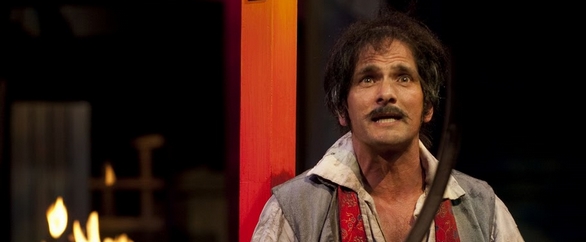 But he attains his zenith, or nadir – hard to say which – when, after his scream of betrayal and calumny of everything and everyone, his fellow officers ‘unmuffle’ him, and he stands exposed in what you might think was the last degree of ignominy. His reaction? ‘Who cannot be crushed with a plot?’ There is no other line quite like this in the whole of Shakespeare. To be sure, Falstaff dusts himself off fairly breezily after he realizes he has been made ‘an ass’ in Merry Wives. But his attitude is more resigned – you win some, you lose some, and as you get older you lose more. But Parolles is another creature entirely. It is not that he is beyond shame. He has clearly never known what shame is – or guilt, or morality, or principle, or loyalty, or anything else by which society has tried to bind, and bond, and dignify itself. He is not, certainly not, evil. He is nothing at all. But there he breathtakingly is, demanding to live. His soliloquy, after his fellow officers leave him alone with his disgrace, is uttered, one feels, with a certain placidity and peace of mind, and is in some way definitive:
But he attains his zenith, or nadir – hard to say which – when, after his scream of betrayal and calumny of everything and everyone, his fellow officers ‘unmuffle’ him, and he stands exposed in what you might think was the last degree of ignominy. His reaction? ‘Who cannot be crushed with a plot?’ There is no other line quite like this in the whole of Shakespeare. To be sure, Falstaff dusts himself off fairly breezily after he realizes he has been made ‘an ass’ in Merry Wives. But his attitude is more resigned – you win some, you lose some, and as you get older you lose more. But Parolles is another creature entirely. It is not that he is beyond shame. He has clearly never known what shame is – or guilt, or morality, or principle, or loyalty, or anything else by which society has tried to bind, and bond, and dignify itself. He is not, certainly not, evil. He is nothing at all. But there he breathtakingly is, demanding to live. His soliloquy, after his fellow officers leave him alone with his disgrace, is uttered, one feels, with a certain placidity and peace of mind, and is in some way definitive:
Yet am I thankful. If my heart were great
‘Twould burst at this. Captain I’ll be no more,
But I will eat and drink and sleep as soft
As Captain shall. Simply the thing I am
Shall make me live. Who knows himself a braggart,
Let him fear this; for it will come to pass
That every braggart shall be found an ass.
Rust, sword; cool, blushes; and Parolles live
Safest in shame! Being fooled, by fool’ry thrive!
There’s place and means for every man alive.
I’ll after them.
If my heart were great – but it isn’t, and that’s that. ‘Simply the thing I am shall make me live’ – it is a far cry from Richard’s ‘I am myself alone.’ It is the difference between heroic, overreaching Renaissance individualism, and an impoverished cluster of the most basic appetites. With Parolles, we could join the mean streets of the twentieth-century city. But he won’t die, and you won’t shake him off – ‘I’ll after them.’ This is the point of his final exchange with Lafew (who can’t resist teasing him – ‘How does your drum?’). Parolles is a supplicant: ‘It lies in you, my lord, to bring me in some grace, for you did bring me out. (V, ii, 49-50). (Bertram will also, shortly, need someone to bring him in some grace.) Lafew at first responds chidingly: ‘Out upon thee, knave! Dost thou put upon me at once both the office of God and the devil? One brings thee in grace and the other brings thee out.’ (Again, a larger theme is glanced at – do, can, humans take on the office of God, and the devil?) But he concludes compassionately: ‘Sirrah, inquire further after me. I had talk of you last night; though you are a fool and a knave you shall eat. Go to, follow’ (V, ii, 51-7). This is part of the final muted mood of this curious ‘comedy’; not, certainly, festive – but nobody, not even the fools and knaves, will starve.
The must succinct comment on Parolles comes from a lord who overheard some of his shameless self-communings (if nothing else, paroles knows himself clearly and unself-deludingly enough) – ‘Is it possible he should know what he is, and be that he is?’. That is the wonder of the man. Not that he is a rogue (nothing new there); but that he seems oblivious to notions of roguery (no wallowing in villainy here, no determined embrace of evil) – he just doesn’t care. It is a little frightening – ethical discourse would be meaningless to him; he is completely unreachable on such matters. Yet there he stands like the rest of us – a hungry human being. But meanwhile, during the Florentine military scenes, Bertram is acquitting himself even more dishonourably. The timing is nice – his fellow captains have set the trap for Parolles and promise Bertram some ‘sport’: ‘When his disguise and he is parted, tell me what a sprat you shall find him.’ (III, vi, 107-8). (It will, of course, be only a matter of time before Bertram’s ‘disguise and he is parted’ as well.) But Bertram first wants to pursue some other sport, with a local lass (Diana).
Second Lord:
But you say she’s honest.
Bertram:
That’s all the fault.
Fault indeed, when a lass should be tiresomely ‘honest’: but whatever happened to the chivalric code, the courtier’s code, the gentleman’s code, all the codes? And the other captains see Bertram, what he is, as clearly as they see through Parolles.
Second Lord:
He hath perverted a young gentlewoman here in Florence of a most chaste renown, and this night he fleshes his will in the spoil of her honor; he hath given her his monumental ring, and thinks himself made in the unchaste composition.
First Lord:
Now, God delay our rebellion! As we are ourselves, what things are we!
The [words in bold] express a powerful, vehement disgust. This man is a disgrace – he is sunk in spoilt honour. And there is a curious half-echo of the recent comment on Parolles – ‘Is it possible he should know what he is, and be that he is?’: ‘As we are ourselves, what things we are!’ There is a scent here of a sort of weary incredulousness at just how awful humans can be, which lingers in the louring air of the play.
Bertram thinks he is buying Diana’s body by giving her his ‘monumental ring.’ There is such a ring in the original tale; it is one of the wife’s ‘impossible’ tasks to get it off her husband’s finger. Shakespeare adds a second ring, which, among other things, allows for further complications and attenuations in the last scene (and, not incidentally, allows Bertram to double his ignominy). Rings (female) and drums (male) should symbolize some kind of honour, and Shakespeare brings both into the foreground of his play; not just to point up the always possible struggle between the ring and the drum (and all they stand for), but also to show them both sullied, devalued, degraded. The drum is simply a farcical factor in Parolles’ disgrace. The ‘monumental ring’ should fare better: in Bertram’s own words to Diana when, following instructions, she requests it:
It is an houonr ‘longing to our hose,
Bequeathed down from many ancestors,
Which were the greatest obloquy I’ th’ world
In me to lose.
To which Diana has an unanswerable reply:
Mine honor’s such a ring;
My chastity’s the jewel of our house,
Bequeathed down from many ancestors,
Which were the greatest obloquy i’ th’ world
In me to lose.
So Bertram makes the ‘unchaste composition’ (bargain, arrangement): ‘Here, take my rings./My house, mine honor, yea, my life be thine.’ As Helena predicted he would:
a ring the County wears,
That downward hath succeeded in his house
From son to son some four or five descents
Since the first father wore it. This ring he holds
In most rich choice; yet, in his idle fire,
To buy his will it would not seem too dear,
Howe’er repented after.
(III, vii, 22-8)
There is something rather awesomely biblical about ‘the first father’: cumulatively, it feels as if there were some ancient, even primal virtue, as well as dynastic honour and paternal potency, mystically lodged in the ring. The more profane and sacrilegious, then, Bertram’s easy surrendering it as part of a dirty deal – ‘to buy his will’ (lust). So much for the regimental drum; so much for the family ring. ‘Obloquy’ indeed (‘obloquy’ – to be everywhere spoken against: there is, indeed, nothing to be said for Bertram by the time Shakespeare has finished with him).
——————————————-
So…how’s everybody doing? What are your thoughts on All’s Well? Is anybody enjoying it?
And as a fun weekend bonus…this Hamlet mashup:
————————————-
Our next reading: All’s Well That Ends Well, Act Five
My next post: Sunday evening/Monday morning
Enjoy. And enjoy your weekend.



So, Diana is just a plot device and we are not expected to care that her mother has sold her reputation just because Helena needs their help? I know all it turns out alright in the end, but it doesn’t seem fair that virginal Diana loses her reputation over this. Maybe she and her mother could start a business on the side securing wayward husbands for abandoned wives.
Actually, in Act 5, Scene 3,lines 327+, the king promises to take care of her: “If thou be’st yet a fresh uncropped flower,/Choose thou thy husband and I’ll pay thy dower.” And Diana’s mother did know that nothing was going to happen, and I suspect, we can believe that Helena told her that everything would work out all right at the end. But…yeah.
Really enjoyed this commentary,which I came across while checking Parolles’ words. Thank you.
– Strange no one has compared Trump to Parolles.